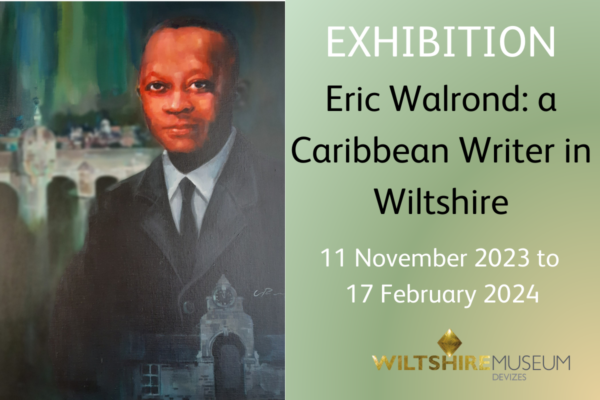This exhibition tells the story of Eric Walrond, spotlighting his time in Wiltshire, drawing attention to his writing and the political issues which he sought to tackle.
Exhibition extended to 9 March!
Eric Walrond (1898 – 1966) was an unassuming Caribbean man who lived in Bradford on Avon, Wiltshire, in the 1940s. He worked at a local factory, lodged in the town and went 'under the radar' - apart from being the only Black resident in a town of 4,000 people.
What many of his neighbours did not realise, however, was that Walrond was an established writer, author of Tropic Death, and part of 1920s New York’s ‘Harlem Renaissance’ cultural community of Black creatives. Awarded a Guggenheim Fellowship, his fiction vividly recalls his upbringing in British Guiana (now Guyana) and Panama, in addition to American racism. He later moved to France and then London, before arriving in Wiltshire at the outbreak of World War II. He records city evacuees in rural Wiltshire, and how locals both welcomed, and ostracised, Black American GIs, Commonwealth soldiers and Black Britons stationed on Salisbury Plain.
Poor mental health led him to self-refer to the Roundway Hospital in Devizes in 1952. Here he found compassionate, creative therapy and he founded the monthly ‘Roundway Review’ contributing stories and articles. After leaving the hospital in 1956 he moved to London, working for an import-export firm in his later years. He died of a heart attack in 1966 and is buried in Abney Park Cemetery, London.

Wiltshire Museums copy of Tropic Death
Tropic Death
Whilst searching for objects to accompany this exhibition we found a signed copy of Eric Walrond's acclaimed book, Tropic Death, which included a short message to one of his supporters, Mrs Underwood.
With a grant from the Friends of National Libraries we were able to purchase it for our collection. The book diversifies and adds to our collection of Eric’s writing.
Read a review of Tropic Death by one of our colleagues and read it on Project Gutenberg here.
Online Lecture: Eric Walrond: A Caribbean American Writer in Exile in Wiltshire
In this presentation, biographer James Davis (Brooklyn College - City University of New York) describes the peripatetic career of fiction writer and journalist Eric Walrond.
A FREE online lecture - Thursday 25 January 2024, 7.30 pm
More details and to book a place - click HERE

Eric Walrond Book Club
Join us for a friendly discussion of Eric Walrond's work over a cup of tea and a slice of cake. We will be talking about some of his articles and short stories, which are downloadable from the event page.
A FREE event - Tuesday 20 February 2024, 2 pm
More details and to book a place - click HERE
Gallery

(c) Clifton Powell, 2023 Commissioned by Wiltshire Museum, funded by Art Fund
Portrait of Eric Walrond
This new portrait of Eric Walrond was commissioned by Wiltshire Museum and funded by Art Fund with contributions from the National Lottery Heritage Fund, local charity Omnes ad Unum and our own funds. The work is by acclaimed artist Clifton Powell.
Caribbean born writer, Eric Walrond (1898 – 1966), lived in Bradford on Avon, Wiltshire during World War Two. His key work was the novel ‘Tropic Death’, inspired by his formative years. Whilst living in New York in the 1920s, Walrond was awarded the Guggenheim Fellowship and the Harmon Foundation Award for achievement in literature. During his years in Wiltshire he worked in a local rubber making factory. This new portrait reflects his time in Bradford upon Avon, with one of the town’s monuments in the background and the entrance to Roundway Hospital on the right, reflecting his time of recovery from poor mental health. Eric is shown as composed and pensive, holding a copy of Tropic Death, and dressed in one of the smart suits he was known to favour.
The artist, Clifton Powell, was also born in the Caribbean and used his own experiences and interpretation of Walrond’s life, to bring this portrait alive. Clifton is an acclaimed artist who studied at the Jamaica School of Art, Kingston, Jamaica, before moving to the UK at the end of the 1980s. He has worked with a number of organisations, including Art Together, and exhibited alongside established black artists from all over the world such as Paul Goodnight. Clifton's unique style was developed when he painted in Jamaica, combining fluid draughtsmanship with realism and a dynamic use of colour.
Eric Walrond

Tropic Death

First published 1926
The exhibition runs at Wiltshire Museum from Saturday 11 November 2023 to Saturday 17 February 2024
- Winter Opening Times 10 am to 4 pm (Monday 30 October to Friday 22 March 2024).
- Before making your journey, please check the Visit Us page for details of potential changes to these times, e.g. Bank Holidays.
Entry to the exhibition is included in your admission ticket - book online. Tickets cost from £7.50 (concessions available). Free for under 18s
Digital Resources
Digital resources have been prepared to support the 'Lest We Forget' and 'Eric Walrond' exhibitions by Isaac Rawcliffe, MA Student at the University of Winchester.
To view the resources Click Here
Plus: Lest We Forget
An exhibition highlighting unknown or forgotten stories of those who identify as black, including Caribbean soldiers who were training in Salisbury plain during World War I, and African-American soldiers in camps around Wiltshire in World War II
On display at Wiltshire Museum Saturday 11 November 2023 to Saturday 17 February 2024.
Find out more HERE
Acknowledgments
"Eric Walrond: A Caribbean writer living in Wiltshire” is made possible with The National Lottery Heritage Fund and National Lottery Players.
The new portrait of Eric Walrond is made possible with a grant from Art Fund.
Racism and historical racial language
The language and tone of the exhibition content has been checked by sensitivity checkers to ensure it is respectful, and takes a balanced approach to the difficult themes of racism that are present.
If you feel you could be impacted detrimentally by reading about racism or seeing historical racial language, please consider this before entering the exhibition, so that your visit to the Museum is as enjoyable as possible.






